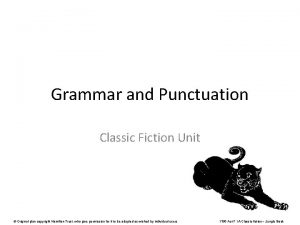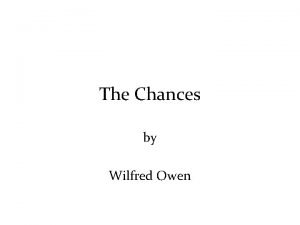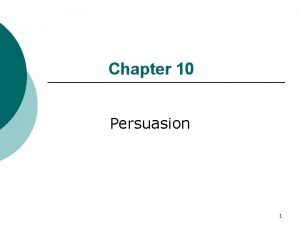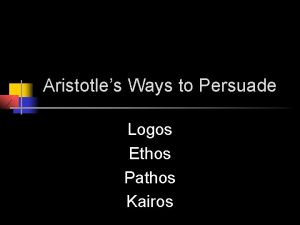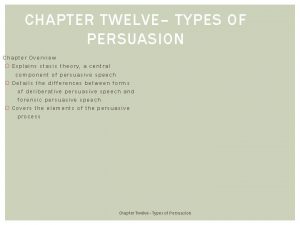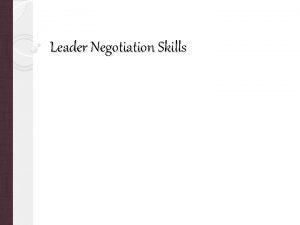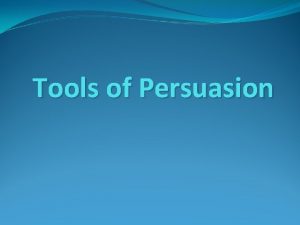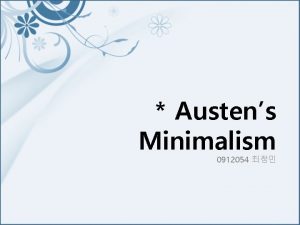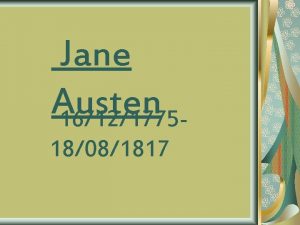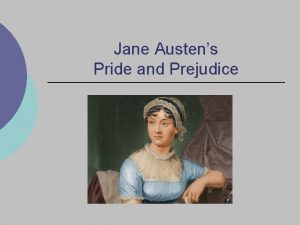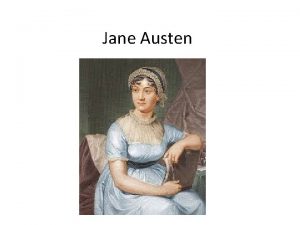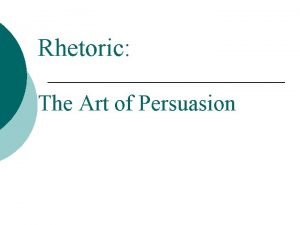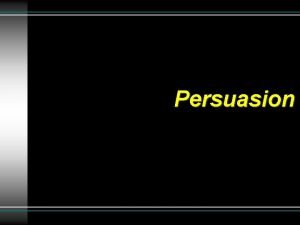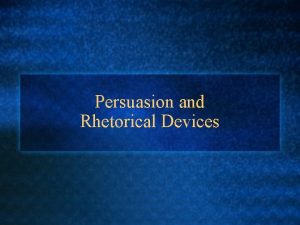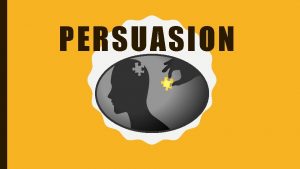Jane Austens Persuasion A novel of second chances










![On Constancy “[Captain Harville said, ] ‘I will not allow it to be more On Constancy “[Captain Harville said, ] ‘I will not allow it to be more](https://slidetodoc.com/presentation_image_h2/8f94658056193a610c73ee4e5f611cc3/image-11.jpg)
![Austen’s Feminism “[Captain Harville continued], ‘We shall never agree upon this question…No man and Austen’s Feminism “[Captain Harville continued], ‘We shall never agree upon this question…No man and](https://slidetodoc.com/presentation_image_h2/8f94658056193a610c73ee4e5f611cc3/image-12.jpg)
- Slides: 12

Jane Austen’s Persuasion A novel of second chances, enduring love, dreadful relatives, and a girl with a self-induced head injury

Jane Austen, 1775 -1817

The Napoleonic Wars lasted from 1803 -1815 Napoleon I led the French against various European countries in his attempts to expand the French Empire Napoleon dominated the Western world from 1803 until his unfortunate decision to invade Russia in 1812 Defeated in 1814, Napoleon was exiled to Elba In 1815, he escaped from Elba and raised an army in France On June 18, 1815, Napoleon was defeated at Waterloo and exiled to St. Helena

The Royal Navy and the Nouveau Riche The Royal Navy was extremely active during the Napoleonic Wars In 1805, the stunning victory at Trafalgar under Lord Nelson ensured that the French would not invade England The Royal Navy was instrumental in establishing Britain as a major colonial force Many sailors amassed significant fortunes in skirmishes around the world As such, there is a class of persons of relatively low birth who return to England with substantial material resources This is part of the general shift away from the landed aristocracy towards the nouveau riche in Britain

Publication History of Persuasion Austen commenced writing The Elliots in 1815 She completed the text in January of 1817, despite her rapidly failing health Henry Austen named the book Persuasion instead of The Elliots Persuasion was published together with the previously unpublished Northanger Abbey in December 1817 These two novels were the first published under Austen’s name Henry Austen wrote a beautiful biographical account of Jane as a foreword to the two novel

Overview of Persuasion Anne Elliot (A lovely, elegant, accomplished young woman) Elizabeth Elliot (Anne’s beautiful, shallow, and clueless older sister) Sir Walter Elliot (Anne’s father, unhealthily obsessed with people’s physical beauty) Captain Frederick Wentworth (Anne’s first and only love, a Captain in the Navy) Mrs. Clay (Elizabeth Elliot’s conniving friend with freckles and a projecting tooth) Lady Russell (Anne’s dearest friend, a consummate snob) Mary Musgrove and Charles Musgrove (Anne’s sickly and complaining sister and her long-suffering husband) Louisa and Henrietta Musgrove (Charles’s sisters; good-tempered, pretty girls in love with Captain Wentworth)

Louisa’s Ill-Advised Jump “By this time the report of the accident had spread among the workmen and boatmen about the Cobb, and many were collected near them, to be useful if wanted, at any rate, to enjoy the sight of a dead young lady, nay, two dead young ladies, for it proved twice as fine as the first report. ”

What is Persuasion? Two definitions: The action or fact of influencing someone or of being influenced to do or believe something A belief or set of beliefs Influence is the use of power—or, sometimes, logos, pathos, or ethos—to convince someone to do something

Persuasion and the Role of Women in Regency England Scholars suggest that “persuasion” refers particularly to the parents’ rights over the marriage of daughters Women are expected to yield to influence in a way that men are not For a woman, “duty” refers to giving over her own preferences, desires, and persuasions to those of others Anne Elliot is the perfect mixture of duty and character; she knows when to yield to persuasion in the name of duty and when to stick to her guns

Double Entendre in Dialogue Captain Wentworth: “Fanny Harville was a very superior creature; and his attachment to her was indeed attachment. A man does not recover from such a devotion of the heart to such a woman— He ought not—does not. ” Anne Elliot: “[W]hen the pain is over, the remembrance of it often becomes a pleasure. ” Anne Elliot: “I am no card player. ”
![On Constancy Captain Harville said I will not allow it to be more On Constancy “[Captain Harville said, ] ‘I will not allow it to be more](https://slidetodoc.com/presentation_image_h2/8f94658056193a610c73ee4e5f611cc3/image-11.jpg)
On Constancy “[Captain Harville said, ] ‘I will not allow it to be more man's nature than woman's to be inconstant and forget those they do love, or have loved. I believe the reverse. I believe in a true analogy between our bodily frames and our mental; and that as our bodies are the strongest, so are our feelings; capable of bearing most rough usage, and riding out the heaviest weather. ’ “‘Your feelings may be the strongest, " replied Anne, "but the same spirit of analogy will authorise me to assert that ours are the most tender. Man is more robust than woman, but he is not longer lived; which exactly explains my view of the nature of their attachments. Nay, it would be too hard upon you, if it were otherwise. You have difficulties, and privations, and dangers enough to struggle with. You are always labouring and toiling, exposed to every risk and hardship. Your home, country, friends, all quitted. Neither time, nor health, nor life, to be called your own. It would be hard, indeed" (with a faltering voice), ‘if woman's feelings were to be added to all this. ’”
![Austens Feminism Captain Harville continued We shall never agree upon this questionNo man and Austen’s Feminism “[Captain Harville continued], ‘We shall never agree upon this question…No man and](https://slidetodoc.com/presentation_image_h2/8f94658056193a610c73ee4e5f611cc3/image-12.jpg)
Austen’s Feminism “[Captain Harville continued], ‘We shall never agree upon this question…No man and woman, would, probably. But let me observe that all histories are against you--all stories, prose and verse. If I had such a memory as Benwick, I could bring you fifty quotations in a moment on my side the argument, and I do not think I ever opened a book in my life which had not something to say upon woman's inconstancy. Songs and proverbs, all talk of woman's fickleness. But perhaps you will say, these were all written by men. ’” ”[Anne replied], ‘Perhaps I shall. Yes, yes, if you please, no reference to examples in books. Men have had every advantage of us in telling their own story. Education has been theirs in so much higher a degree; the pen has been in their hands. I will not allow books to prove anything. ’"
 Second chances lumi
Second chances lumi Jane eyre as a victorian novel
Jane eyre as a victorian novel One subject of felipe alfaus second novel grammar
One subject of felipe alfaus second novel grammar More choices more chances
More choices more chances Wilfred owen the chances
Wilfred owen the chances Rolling the dice and taking chances chapter 1 lesson 3
Rolling the dice and taking chances chapter 1 lesson 3 186 282 miles per second into meters per second
186 282 miles per second into meters per second Hovland persuasion model
Hovland persuasion model Etos logos patos kairos
Etos logos patos kairos Persuasive process
Persuasive process Ensayo de persuasión
Ensayo de persuasión Kenneth berrien persuasion model
Kenneth berrien persuasion model Tools of persuasion
Tools of persuasion


